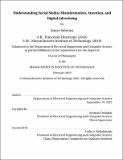| dc.description.abstract | Online platforms have fundamentally changed the dynamics of social interactions and information transmission. In this thesis, I explore recent trends in social media through models and experiments of user behavior, platform algorithms and incentives, and policy initiatives. I focus on the social consequences of new communication technologies, their intended and unintended societal consequences, and how to steer them in more socially beneficial directions.
In recent years, social media has become a breeding ground for misinformation, but the reasons misinformation spreads are still imperfectly understood. First, I discuss the role of social media in the propagation of misinformation, how latent platform algorithms may exacerbate its influence, and analyze various policies to correct misinformation spread. Technological advances stemming from social media have also enabled users to systematically access a deluge of information; yet, it is unclear to what extent this technology has actually helped to better inform. In the second part of the thesis, to characterize the landscape of digital content, I propose a model of content creation and consumption on digital platforms where users have limited attention, and discuss related experiments on the role of algorithmic ranking in user engagement. Lastly, we observe that business models of online platforms drive much of the content creation and algorithmic choices of platforms, and ultimately impact human-machine interactions. The final part of the thesis discusses the various business models of media platforms, their implications for consumer welfare, and possible remedies. | |
